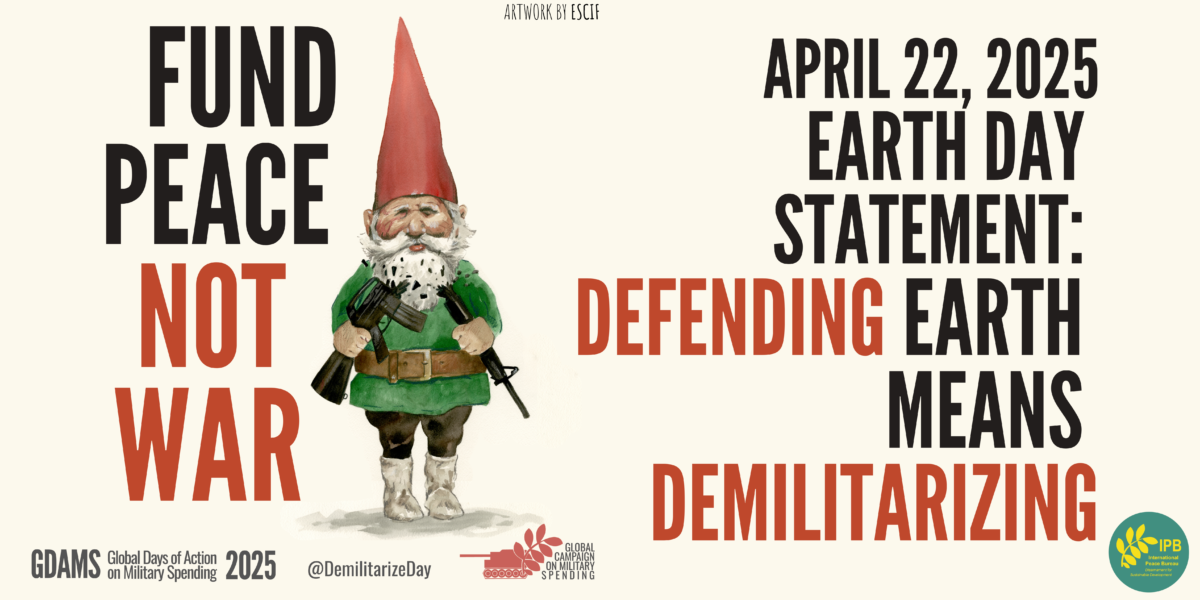By Pere Brunet, researcher and activist at Centre Delàs and GCOMS.
Originally posted on the GCOMS website here.
A Spanish version of this article was published in El Salto.
In front of global warming, resource depredation and the climate crisis, we face an ethical dilemma. If we are aware that the Earth hosts us during our short life and that we have the obligation to respect it, perhaps we could reverse the current ecocidal practices and move toward more democratic and collaborative societies. Otherwise, we know that the short-sighted and militarized business can end up threatening our survival as a species, or at least that of millions of people worldwide.
It’s actually curious. We search for life on other planets while disregarding life on Earth, ignoring human dignity, harming the biosphere, and treating natural resources as if they were limitless.
Defending Earth requires demilitarizing. Because the emissions from the military sector contribute directly to global warming. Because the military security systems guarantee the extraction and supply of oil, gas and natural resources that also worsen the climate crisis. Because we need the funds from military budgets to face the very serious climate crisis that is upon us. Because addressing this crisis should be the top priority of all world governments, along with social spending and far ahead of all kinds of armed disputes and conflicts over power and territory.
The warnings go back a long way. In addition to proclaiming that we should move from weaponry to livingry that takes care of people, Buckminster Fuller published in 1969 a text titled “Operating manual for spaceship Earth”. In it he explained that Earth resembles a spaceship: from outer space it appears as a point of blue light traveling through the darkness of the Universe. And comparing humanity with astronauts, he observed that these should follow three rules: take care of the ship, manage their limited fuel very well and be well matched. Because messing up the ship or getting into a fight can be fatal. His conclusion was that we should know how to manage the limited resources of the planet, seeing that our only salvation as humanity is to cooperate, respecting the planet and leaving behind violence and war.
Indeed, we’re not celebrating Earth Day when we intend to rearm and increase our military budget. To actually celebrate Earth Day would mean:
- Being aware of the incredible human and environmental damage that global power networks cause through their predatory, neo-colonial, neocapitalist and militarized practices.
- Demilitarizing our minds. Listening to the voices that the official narratives seek to silence, questioning the biased messages we receive, and verifying their truthfulness and authorship.
- Detecting which are the real causes of the current problems our planet is suffering from, becoming indignant and denouncing their practices.
- Actively working to stop the capitalist excess and come back to the circle of the ecological and natural balance that we should have never exceeded. Learning to downsize in order to live better. Reducing emissions, consumption and weaponry.
- Taking care of the planet that hosts us, proclaiming that the actual neo-colonial practices and policies are unsustainable and criminal for the present and future peoples. Demanding a transition to respectful and post-colonial methods.
- Demanding urgent and effective policies to decarbonize and leave behind the oil civilization. Supporting a local, community-based, and respectful energy transition. Demanding the control and transparency of the emissions of the entire military system, which far from contributing to the solution, is a central part of the problem and of the environmental crisis.
- Proclaiming that it is essential to reduce military budgets. Demilitarizing and disarming. Going from weaponry to livingry. Participating in campaigns like GCOMS, making ourselves heard during the GDAMS days, remembering the warnings that science has made and continues to make with the clear message that we should take back the funds that are currently being allocated to defence, because the Earth needs the money that is being spent on the military.
- Listening and heeding the silenced voices that are also coming from feminism, marginalized people and indigenous communities. Wise voices that understand us as part of nature and its harmony, never superior to it.
- Fighting to break the global networks of power that are based on violence and consumption, oligarchies and centers for the dissemination of racist, patriarchal, supremacist and bellicist messages. Using consumption and objection as empowering tools of peoples against the business that feeds on what we buy from them.
- Defending that we have to build new geopolitics, based on respect to the limits of the planet and the dignity and rights of people. A people-centered geopolitics: of the people and for the people. A human geopolitics that is based on the resolution of conflicts through negotiation and dialogue.
- Proclaiming and pursuing injustices, crimes against humanity and all the ecocidal and genocidal actions against humanity, the biosphere and the Earth. Defending the imperative need to reduce global military spending in order to take care of the Earth and the life that it hosts. Denouncing those responsible so that fear and shame may, once and for all, change sides.

